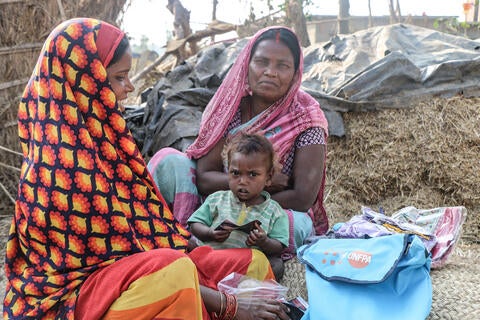“My hands started trembling the moment the roof of our house was blown away. I ran towards my neighbor’s house to save myself,” says Jagga Majhi, who is six months pregnant. The 17-year-old spent most of the night in a panic as Nepal’s first recorded tornado struck her village in the southern plains on 31 March 2019.
Currently, she is living in a government-donated tent together with her family in the village of Parwanipur Rural Municipality, close to the border with India. Many people in her village are still trying to come to terms with the loss they suffered as a result of the tornado. “My family lost all our food grains and clothes. Luckily, my family members escaped the tornado unscathed,” Majhi adds.
Tragedy and a trail of destruction
The tornado hit Bara and Parsa districts in Province 2, leaving behind a trail of destruction. A total of 28 people died and 1,155 were injured in the disaster, according to the Ministry of Home Affairs. As Nepal Red Cross Society’s initial detailed assessment, a total of 18,100 people were affected with 1,305 houses fully damaged and 1,429 partially.
The destruction resulting from the tornado was severe, in particular houses and infrastructure of essential services such as electricity and water supply systems were affected. Two health posts were damaged.
Protection concerns
The families who lost their houses to the disaster have been forced to live in tents, putting women and girls at a heightened risk of being exposed to sexual and gender-based violence (GBV). The local authorities appealed to UNFPA and WOREC and other humanitarian organizations to provide psychosocial counseling to women and girls in the areas most affected by the tornado.
“Drawing a conclusion based on our assessment, we felt that there is a need for addressing protection issues of women and girls,” says Murari Karki, the disaster focal person and Information Officer at the Chief District Officer’s office, Bara.
Responding to special needs
During natural disasters and other emergencies, reproductive health and protection needs of women and girls are often overlooked. Following the request from local governments, UNFPA supported WOREC to set up four information and psychosocial counseling support centers with DFAT funding to ensure protection needs of women and girls are met and GBV is prevented. Babita Yadav, Deputy Chairperson of Suvarna Rural Municipality, says the tornado also affected the community support system and protection mechanism, making women more vulnerable to sexual violence and exploitation.
“I learned about gender-based violence there,” says Guddu Kumari (13) who visited the center based in Suvarna Rural Municipality. As of April 30, 867 tornado-affected people (779 women and 88 men) were reached by the centers with psychosocial counseling, sessions on GBV prevention and dealing with trauma and grief set up at Suvarna-4, Devtaal-7, Pheta-1 and Parwanipur-4 until 30 May. The centers are run by one coordinator, four psychosocial counsellors and four outreach workers.

Maintaining proper hygiene has been a common problem among the displaced women and girls. The Ministry of Social Development (MoSD) of Province 2 in collaboration with local governments distributed 700 UNFPA-supported Dignity Kits to women and girls of reproductive age. The kits contained hygiene supplies such as cloths, torchlights, sanitary pads, soap and underclothes.
Restoring health services temporarily
After the disaster blew off Pheta the roof of Health Post in Pheta-6, Prasuani, UNFPA supported the MoSD and the local government to set up a tent from where health services, including sexual and reproductive health, can be provided to the affected people temporarily.
Humanitarian response should never neglect women and girls’ access to sexual and reproductive health services, says Dr. Ramesh Kumar Kharel, who was deployed by the Ministry of Health and Population to Bara and Parsa.



